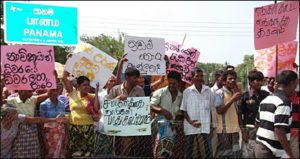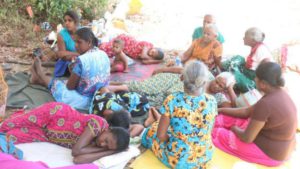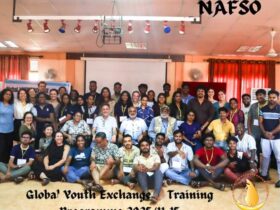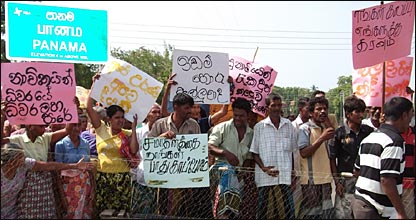The National Fisheries Solidarity Movement [NAFSO] of Sri Lanka presents this case as part of the case study portfolio of WFFP members, to serve as the platform for the discussions at the WFFP General Assembly in November 2017. The theme for this historic event is “Small Scale Fishers of WFFP Back to New Delhi after 20 Years”.
NAFSO is a network of fisheries organizations, CBOs, NGOs, Women organizations, and Environmental organizations from 17 districts in Sri Lanka. For 20 years, NAFSO has applied the human rights based approach in its work on small-scale fisheries. It has 9,500 active small-scale fisher members, of whom 55% are women, spread around 192 villages and encompassing cross-cutting issues like Internally Displaces People, women in fisheries, fisher-farmer water disputes, fishing and climate change and ethical and trans-boundary fishing conflicts.
The Challenge:
Eight [8] years have passed since the 30-year war ended. A new government in 2015 was hoped to usher in space for claiming properties and rights lost from war and the projects and programs adopted through the Neo-Liberal Economic policies of previous leadership. This case briefly describes a group of fishing families who had the grit to swim against the onslaught of militarization and tourism development brought about by the war.
On the night of 17th July 2010, Paanama people living in 5 villages in Lahugala divisional secretariat in Ampara district of the Eastern province were forcefully evicted from their 1200 acres of coastal lands and lagoons by unidentified people whose faces were covered with black masks and who were equipped with T 56 machineguns. In the villages of Ragamwela and Shashtrawela, around 380 acres of land [declared by 11 February 2015 Cabinet decision to be 365 acres.] were captured by the Air Force and demarcated with an electric fence while 860 acres of land from three other villages – Uplassa, Horewkanda and Egodayaya – were captured by the Navy and also enclosed by a fence.
From 2010 onwards, the villagers have witnessed the construction of buildings for the Navy and the development of a tourist resort named “Paanama Lagoon Cabana” on their territories from which they were dispossessed. The tourist resort, located in the idyllic scenery of the lagoon and mangrove forests, is run by the Navy who also pockets the profit. To further entrench themselves on the land, the Navy has restricted, and even banned in some areas, daytime and night fishing activities.
Besides this, the Air force and Navy constructed two electricity fences to protect people from elephants. The acquired areas were in reality connected with the Lahugala National Sanctuary, which is both an elephant sanctuary and a forest conservation area. In effect, this fencing off has disturbed the balance of the people-forest-animal environment with negative effects for both the people and the natural environment.
Buddhist monks and people are no longer allowed to enter the Valukaramaya temple in Ragamwela village and Samudragiri temple in Paanama, and even the officials of the Department of Archaeology are denied access. This is a direct violation of the cultural rights of the people affected.

In short, 350 families dependent on paddy farming, fishing and Chena cultivation have been displaced, and, consequently, lost their entire source of income. Even their cultural rights had been taken away from them. Their lifeline has been cut off.
On the 08th January 2015, a new government was elected, and subsequently, the Paanama people marked the first ever victory of the struggle with a decisive Cabinet decision of 11th February 2015. The Cabinet of Ministers decided to release 340 acres of land from the 365 acres of land which the military captured in Ragamwela and Shashtrawela villages. However, after 5 months the cabinet decision was still not executed by the local authorities, and anxiety was raised among the Paanama community who, then, decided to occupy their own land even without having legal backing. To date, 35 families have forcefully re-occupied their lands since 26th March 2016 and started cultivating the land.
While displacing the Paanama people, Navy and Air Force have forcefully grabbed the people’s traditional and customary land on the pretext of public purposes. The land has been used for construction of Air Force base post-war and hotels, both of which cannot be considered as public purposes. Further, present and past actions have confirmed that the Paanama coastal land grabbing is well organized and supported by government officials, and the forceful evictions have taking place with the knowledge of the Divisional Secretary, the Police, the Special Task Force, and the Navy and Air Force. Instead of protecting the constitutional and human rights of the Paanama people, they are protecting business interests and serving their own needs.
The Commitment: The people of Paanama have said it – “This is the land where we lived, this is the land where we will die.” It is their commitment to regain possession of their land, be justly compensated for their losses and suffering throughout the years of their displacement and dispossession, and live in dignity protecting and practicing their human rights.

The Ways and Means: The Paanama people established their own movement, the Organization for Protection of Paanama Paththu [OPPP], to campaign against these land grabs and continue their land and human rights struggle.
OPPP’s struggle builds on the conscious awareness of their rights as enshrined in national law and international instruments, such as the International Tenure Guidelines and the International Small-scale Fishery Guidelines. Their actions and strategies involve, but are not limited to, the submission of continuous complaint to the Pothuwil police and the Human Rights Commission; launching advocacy and lobby campaigns; signature campaigns; and legal actions. Specific actions such as determining and firming up land ownership documents are being undertaken as well as expanding the base of supporters within Sri Lanka and internationally.
On the longer term, leveling up through the widening of spaces for discourse and debate complements these strategies. Sri Lanka is lacking a National Fisheries policy to protect the human rights of the fishers, their fishing environment and the resources upon with they depend. OPPP advocates pro-actively for the development of a small-scale fishery policy, which builds on the two above-mentioned set of guidelines, and an inclusive process of working with the government. As part of this action plan, NAFSO and OPPP embark on the education and mobilization of the fishing communities in order to engage in the dialogue confidently and constructively. By taking this approach, community-based resource management is promoted to the benefit of all and for future generations.



Leave a Reply